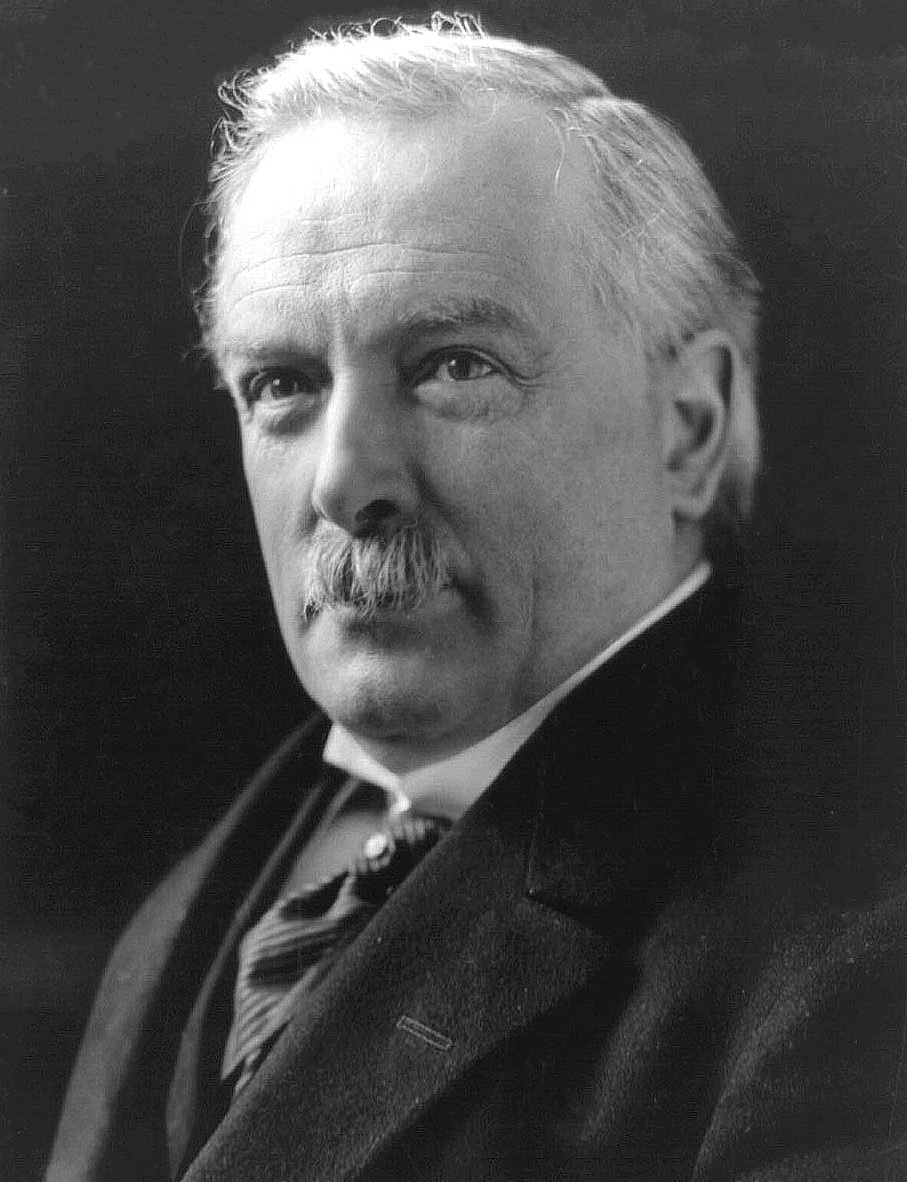Fontainebleau-Memorandum zum Versailler Vertrag, 25. März 1919. Geschichte und Geschehen 2, Verlag Ernst Klett, 2. Auflage, S.445
"You may strip Germany of her colonies, reduce her armaments to a mere police force and her navy to that of a fifth rate power; all the same in the end if she feels that she has been unjustly treated in the peace of 1919 she will find means of exacting retribution from her conquerors." - The "Fontainebleau Memorandum" of Mr. Lloyd George (dated March 25, 1919), tmh.floonet.net http://tmh.floonet.net/articles/fontainebleaumemo.html
Zitate mit Quellenangabe
David Lloyd George Berühmte Zitate
„Ich weiss, was man zum Kriegführen braucht! Glauben Sie mir, Deutschland ist nicht dazu imstande“
1934, zum zwanzigsten Jahrestag des Kriegsausbruchs 1914. Zitiert bei Leopold Schwarzschild: Das Neue Tage-Buch, 1934 S. 749. http://books.google.de/books?id=4EwHAQAAIAAJ&q=%22dazu+imstande%22
"Believe me, Germany is unable to wage war." - Zitiert bei Leopold Schwarzschild: World in Trance. London Hamish Hamilton 1942. p. 238. http://books.google.de/books?id=3jugAAAAMAAJ&q=%22is+unable%22
Zitate mit Quellenangabe
Nach seinem Besuch in Berchtesgaden bei Adolf Hitler am 4. September 1936. Zitiert bei Hellmut Diwald: Deutschland einig Vaterland - Geschichte unserer Gegenwart. Books on Demand 2006. S. 45. Google Books
David Lloyd George: Zitate auf Englisch
Speech http://hansard.millbanksystems.com/commons/1928/mar/27/ministry-of-defence in the House of Commons (27 March 1928)
Later life
The Truth about Reparations and War-Debts (London: William Heinemann Ltd, 1932), pp. 8-9
Later life
Speech to the Nottinghamshire Miners' Association (10 August 1913) on the National Insurance Act 1911, quoted in The Times (11 August 1913), p. 10.
Chancellor of the Exchequer
Speech in Limehouse, East London (30 July 1909), quoted in Better Times: Speeches by the Right Hon. D. Lloyd George, M.P., Chancellor of the Exchequer (London: Hodder & Stoughton, 1910), p. 155.
Chancellor of the Exchequer
Quoted in Lord Riddell's diary entry (31 March 1919), J. M. McEwen (ed.), The Riddell Diaries 1908-1923 (London: The Athlone Press, 1986), pp. 263-264
Prime Minister
Speech http://hansard.millbanksystems.com/commons/1907/jun/26/house-of-lords in the House of Commons (26 June 1907)
President of the Board of Trade
Speech at Mansion House (21 July 1911) during the Agadir Crisis, quoted in The Times (22 July 1911), p. 7
Chancellor of the Exchequer
Quoted in A. J. Sylvester's diary entry (26 November 1941), Colin Cross (ed.), Life with Lloyd George. The Diary of A. J. Sylvester 1931-45 (London: Macmillan, 1975), pp. 296-298
Later life
Speech in Limehouse, East London (30 July 1909), quoted in Better Times: Speeches by the Right Hon. D. Lloyd George, M.P., Chancellor of the Exchequer (London: Hodder & Stoughton, 1910), p. 148.
Chancellor of the Exchequer
Speech http://hansard.millbanksystems.com/commons/1912/may/16/second-reading-fourth-days-debate in the House of Commons (12 May 1912) on the Bill to disestablish the Anglican church in Wales
Chancellor of the Exchequer
Speech in the House of Commons (6 January 1904)
Backbench MP
“Death is the most convenient time to tax rich people.”
In Lord Riddell's Intimate Diary of the Peace Conference and After, 1918-1923 (1933)
Later life
“We have murder by the throat.”
On the Irish Republican Army, in a speech at Guildhall, London (9 November 1920), quoted in The Times (10 November 1920), p. 12
Prime Minister
War Memoirs: Volume I (London: Odhams, 1938), p. 21.
War Memoirs
Quoted in Lord Riddell's diary entry (13 October 1914), J. M. McEwen (ed.), The Riddell Diaries 1908-1923 (London: The Athlone Press, 1986), p. 92
Chancellor of the Exchequer
Frances Stevenson's diary entry (7 February 1935), A. J. P. Taylor (ed.), Lloyd George: A Diary (London: Hutchinson, 1971), p. 300
Later life
Quoted in Colonel Edward House's diary entry (4 November 1918), quoted in Charles Seymour (ed.), The Intimate Papers of Colonel House. Volume IV (Boston, 1928), p. 180
Prime Minister
“Not badly, considering I was seated between Jesus Christ and Napoleon.”
Comment about Woodrow Wilson and Georges Clemenceau, when asked, in 1919 upon his return from the Paris Peace Conference, as to how he had done there; as quoted in the article "International Relations" in The New Encyclopaedia Britannica (1993)
Prime Minister
Speech in Limehouse, East London (30 July 1909), quoted in Better Times: Speeches by the Right Hon. D. Lloyd George, M.P., Chancellor of the Exchequer (London: Hodder & Stoughton, 1910), p. 156.
Chancellor of the Exchequer
Frances Stevenson's diary entry (16 December 1914), A. J. P. Taylor (ed.), Lloyd George: A Diary (London: Hutchinson, 1971), p. 17
Chancellor of the Exchequer
“Hitler is a prodigious genius.”
Quoted in A. J. Sylvester's diary entry (7 July 1940), Colin Cross (ed.), Life with Lloyd George. The Diary of A. J. Sylvester 1931-45 (London: Macmillan, 1975), p. 275
Later life
Speech in Newcastle (9 October 1909), quoted in The Times (11 October 1909), p. 6
Chancellor of the Exchequer
Speech in Conway (c. late July 1892) after the 1892 general election, quoted in Thomas Jones, Lloyd George (London: Oxford University Press, 1951), pp. 16-17.
Backbench MP
As quoted in The Daily Express (17 November 1936)
Later life
Speech in Manchester (21 April 1908), quoted in Better Times: Speeches by the Right Hon. D. Lloyd George, M.P., Chancellor of the Exchequer (London: Hodder & Stoughton, 1910), p. 46.
Chancellor of the Exchequer
Speech in Newcastle (9 October 1909), quoted in The Times (11 October 1909), p. 6
Chancellor of the Exchequer
Speech in Limehouse, East London (30 July 1909), quoted in Better Times: Speeches by the Right Hon. D. Lloyd George, M.P., Chancellor of the Exchequer (London: Hodder & Stoughton, 1910), p. 145.
Chancellor of the Exchequer
“Liberty is not merely a privilege to be conferred; it is a habit to be acquired.”
Speech in the House of Commons (10 May 1928)
Later life
